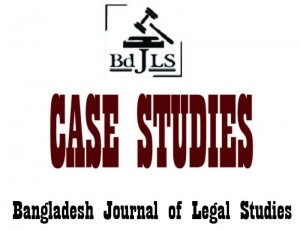Reference : 18 BLC (2013)(HD)
Facts & arguments:
This Rule Nisi was issued at the instance of the petitioner Md. Ibrahim on an application under Article 102(1) & (2) calling upon the respondents to show cause as to why the holding of the imported duty paid goods should not be declared to have been done without lawful authority and is of no legal effect and as to why the respondents should not be directed to release the said imported duty paid goods.
The petitioner opened a Letter of Credit (LC) for import of 4000 Metric Tons of APH Wheat. Consignment arrived at the Chittagong Port under 1 set of Invoice & 1 set of House Bill of Lading against two shipments. Then, he paid the entire LC value (including the freight) to the concerned bank and the bank delivered the duly endorsed shipping documents to the petitioner.
The petitioner submitted bill of entries and all the relevant documents and as per sec 82A of the Customs Act, the respondents are under a statutory obligation to release the consignment within 3 days, but the respondents failed to release the duty paid goods.
The petitioner’s lawyer submits that respondent no.5(bank) already certified that money has been transferred by the petitioner to the negotiating bank(National Australia Bank Limited). The delay in delivering the cargo is patently and evidently due to unlawful withholding on the plea of non-payment of freight. The respondents collectively exercised their statutory control over the cargo under the Port Act 1908, Chittagong Port Authority Ordinance 1976 and the Customs Act 1969 and, therefore, are under a legal obligation to deliver the cargo free from any encumbrance including container/ICD charges after the petitioner-importer has discharged his obligations towards payment of custom duties, taxes and port dues.
The respondent’s lawyer argued that the payment of customs duty and other charges to the customs authority does not create any right to have an automatic delivery of goods. A clearance certificate from the customs authority is a mandatory requirement. But in the present case, the petitioner failed to provide any clearance certificate to the Chittagong Port Authority. Therefore, it is the petitioner’s inability that the goods are still laying at the private depot. Moreover, the petitioner never ever came to the respondent along with the necessary documents, especially ‘out passed’ Bill of Entry from the customs authority. As per LC terms and conditions the customs authority cannot qualify the petitioner to have the release of the goods in question as Mediterranean Shipping Company or MSC(carried two consignment of wheat from Sydney Australia to Chittagong Port) still retains the original Ocean Bill of Lading and it has nothing to do with the House Bill of Lading issued by the freight forwarder.
Now the kernel question is whether the respondents individually or jointly holding the petitioner’s goods in questions without lawful authority.
Judgment :
From the record it appears that the petitioner opened a Letter of Credit clause 46A of which clearly states that the Bill of Lading would be ‘OCEAN BILL OF LADING’ and as per clause 47A(6) of the LC the Bill of Lading issued by ‘Excalivor Logistics’ who is a freight forwarder is not acceptable. So, the Bill of Lading produced by the petitioner in the case in hand is not a bill of lading as per LC terms and conditions and Article 19(a) of schedule of “the Carriage of Goods by Sea Act, 1925”. A House Bill of Lading masquerading as an ocean bill is not a bill of lading at all according to a (i) of the Article 24 of UCP 600 and so did not protect the petitioner on the terms of Bill of Lading.
Moreover, in the present case no ‘out pass’ is produced by the CPA(Chittagong Port Authority) along with the port charges. So the petitioner can’t demand to get the delivery of his goods. No single scrap of paper is found whether the petitioner filed any application to get the cargo from CPA. So, the petitioner can’t say that the CPA refused the delivery of his goods. Depositing customs duty and other charges to the custom authority does not itself mean automatic delivery of the said goods, but a clearance certificate from the customs authority is required as per provision 2.4 of the Chittagong Port (Cargo and Container) Regulations, 2001. But here the petitioner failed to provide the clearance certificate to CPA and thereby it is his responsibility that the goods are still lying at the private depot.
In the light of the above facts and circumstances, the relevant provisions of law and the observations and findings, the court didn’t find any excellence in this Rule and that is why the Rule is discharged.
Umme Wahida Akhtar
Latest posts by Umme Wahida Akhtar (see all)
- Limitation Period for Filing Civil Revision is the Same as Appeal - March 26, 2020
- Single notice for several dishonoured cheques is not acceptable - June 1, 2018
- Jafar Ullah vs Bangladesh - May 25, 2018

Leave a Reply